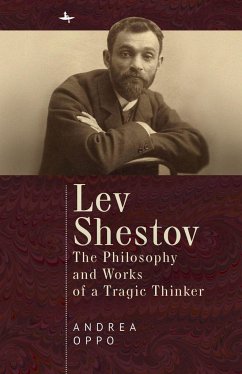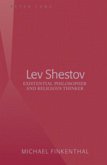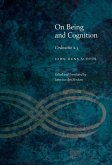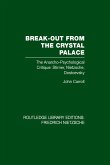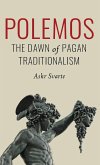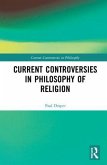- Gebundenes Buch
- Merkliste
- Auf die Merkliste
- Bewerten Bewerten
- Teilen
- Produkt teilen
- Produkterinnerung
- Produkterinnerung
This study spans, in a single monograph, the entire life and work of the Russian philosopher Lev Shestov (1866-1938). It offers essential keys to understanding his thought, while also tracing the historical itinerary and influence of his work both in Russia and in Europe.
Andere Kunden interessierten sich auch für
![Lev Shestov Lev Shestov]() Michael FinkenthalLev Shestov98,55 €
Michael FinkenthalLev Shestov98,55 €![The Tragic Discourse- L'Expérience du tragique The Tragic Discourse- L'Expérience du tragique]() The Tragic Discourse- L'Expérience du tragique66,95 €
The Tragic Discourse- L'Expérience du tragique66,95 €![On Being and Cognition On Being and Cognition]() John Duns ScotusOn Being and Cognition75,99 €
John Duns ScotusOn Being and Cognition75,99 €![Personal Identity and Applied Ethics Personal Identity and Applied Ethics]() Andrea SauchelliPersonal Identity and Applied Ethics190,99 €
Andrea SauchelliPersonal Identity and Applied Ethics190,99 €![Break-Out from the Crystal Palace Break-Out from the Crystal Palace]() John CarrollBreak-Out from the Crystal Palace190,99 €
John CarrollBreak-Out from the Crystal Palace190,99 €![Polemos Polemos]() Askr SvartePolemos32,99 €
Askr SvartePolemos32,99 €![Current Controversies in Philosophy of Religion Current Controversies in Philosophy of Religion]() Current Controversies in Philosophy of Religion180,99 €
Current Controversies in Philosophy of Religion180,99 €-
-
-
This study spans, in a single monograph, the entire life and work of the Russian philosopher Lev Shestov (1866-1938). It offers essential keys to understanding his thought, while also tracing the historical itinerary and influence of his work both in Russia and in Europe.
Hinweis: Dieser Artikel kann nur an eine deutsche Lieferadresse ausgeliefert werden.
Hinweis: Dieser Artikel kann nur an eine deutsche Lieferadresse ausgeliefert werden.
Produktdetails
- Produktdetails
- Verlag: Academic Studies Press
- Seitenzahl: 346
- Erscheinungstermin: 24. November 2020
- Englisch
- Abmessung: 240mm x 161mm x 23mm
- Gewicht: 684g
- ISBN-13: 9781644694671
- ISBN-10: 1644694670
- Artikelnr.: 59924105
- Herstellerkennzeichnung
- Libri GmbH
- Europaallee 1
- 36244 Bad Hersfeld
- gpsr@libri.de
- Verlag: Academic Studies Press
- Seitenzahl: 346
- Erscheinungstermin: 24. November 2020
- Englisch
- Abmessung: 240mm x 161mm x 23mm
- Gewicht: 684g
- ISBN-13: 9781644694671
- ISBN-10: 1644694670
- Artikelnr.: 59924105
- Herstellerkennzeichnung
- Libri GmbH
- Europaallee 1
- 36244 Bad Hersfeld
- gpsr@libri.de
Andrea Oppo is Professor of Contemporary Philosophy at the Pontifical Faculty of Theology of Sardinia (Italy). He is the editor of Shapes of Apocalypse: Arts and Philosophy in Slavic Thought (Boston, 2013), and the author of Philosophical Aesthetics and Samuel Beckett (Oxford, 2008) and of numerous articles on the relationship between philosophy and the arts in the twentieth century.
Table of Contents Acknowledgments Editorial Notes Introduction Part One: Shestov in Russia Chapter I: The Philosophy of Tragedy (1898
1905) 1.1 Introduction: The Birth of a Tragic Conscience 1.2 Shestov before Shestov: Shakespeare and Pushkin 1.3 Tolstoi
s Struggle between
Yasnaya Polyanä and
Astapovo
1.4 Friedrich Nietzsche: Truth against Morality 1.5 Dostoevskii and Nietzsche as
Philosophers of the Underground
1.6 Apotheosis of
Bespochvennost'
: Towards a Philosophy of Tragedy Chapter II: Art as Negativity
The Literary Criticism Years (1901
1910) 2.1 Introduction: Shestov and the Philosophical Problem of Art 2.2 Aestheticism and Ideology: On Merezhkovskii and Turgenev 2.3 Creatio ex Nihilo: Chekhov
s Aesthetics 2.4 The
Oracular
Gratuity of Sologub
s Prose and Poetry 2.5 Ibsen and the Destiny of Art 2.6 Retracting Tragedy: Dostoevskii as an Essayist 2.7 The
Magnificent
Vyacheslav Ivanov Part Two: Shestov in France Chapter III: Wandering Through the Souls (1914
1929) 3.1 Introduction: The Events of History
Shestov
s Political Views 3.2 The Power of Keys: Faith and Church in Martin Luther 3.3 The Two Histories of Western Philosophy 3.4 The Fight against Self-Evidences: Dostoevskii, Pascal, and Spinoza 3.5 Philosophy
s Revolt against Itself: Plotinus
s Ecstasies 3.6 Audacities and Submissions: Shestov
s Intellectual World 3.7 Shestov and the Russian Philosophers Chapter IV: Athens and Jerusalem
The Logic and the Thunder (1930
1938) 4.1 Introduction: Shestov as a
Jewish Philosopher
4.2 The Bible and the Original Sin: In Dialogue with Martin Buber 4.3 The Last Encounter: Kierkegaard 4.4 Étienne Gilson and the Spirit of Medieval Philosophy 4.5 Philosophers in Chains: At the Sources of Metaphysics Conclusion 1. Reception and Legacy of Shestov
s Philosophy 2. The Question of Irrationalism and of
Antiphilosophy
3. The (Neo-)Platonic Paradigm: Shestov
s
Third Sailing
4. Afterword: Reading between the Lines Appendices 1. Shestov and Husserl 2. Shestov and Berdyaev 3. Shestov and Fondane Bibliography and Works Cited 1. Shestov
s Works A.1 Books A.2 Articles and Correspondence 2. Selected Studies on Shestov B.1 Biographies, Memoirs, Specific Journals, and Bibliographies B.2 Books on Shestov B.3 Articles and Book Chapters on Shestov 3. Further References Index
1905) 1.1 Introduction: The Birth of a Tragic Conscience 1.2 Shestov before Shestov: Shakespeare and Pushkin 1.3 Tolstoi
s Struggle between
Yasnaya Polyanä and
Astapovo
1.4 Friedrich Nietzsche: Truth against Morality 1.5 Dostoevskii and Nietzsche as
Philosophers of the Underground
1.6 Apotheosis of
Bespochvennost'
: Towards a Philosophy of Tragedy Chapter II: Art as Negativity
The Literary Criticism Years (1901
1910) 2.1 Introduction: Shestov and the Philosophical Problem of Art 2.2 Aestheticism and Ideology: On Merezhkovskii and Turgenev 2.3 Creatio ex Nihilo: Chekhov
s Aesthetics 2.4 The
Oracular
Gratuity of Sologub
s Prose and Poetry 2.5 Ibsen and the Destiny of Art 2.6 Retracting Tragedy: Dostoevskii as an Essayist 2.7 The
Magnificent
Vyacheslav Ivanov Part Two: Shestov in France Chapter III: Wandering Through the Souls (1914
1929) 3.1 Introduction: The Events of History
Shestov
s Political Views 3.2 The Power of Keys: Faith and Church in Martin Luther 3.3 The Two Histories of Western Philosophy 3.4 The Fight against Self-Evidences: Dostoevskii, Pascal, and Spinoza 3.5 Philosophy
s Revolt against Itself: Plotinus
s Ecstasies 3.6 Audacities and Submissions: Shestov
s Intellectual World 3.7 Shestov and the Russian Philosophers Chapter IV: Athens and Jerusalem
The Logic and the Thunder (1930
1938) 4.1 Introduction: Shestov as a
Jewish Philosopher
4.2 The Bible and the Original Sin: In Dialogue with Martin Buber 4.3 The Last Encounter: Kierkegaard 4.4 Étienne Gilson and the Spirit of Medieval Philosophy 4.5 Philosophers in Chains: At the Sources of Metaphysics Conclusion 1. Reception and Legacy of Shestov
s Philosophy 2. The Question of Irrationalism and of
Antiphilosophy
3. The (Neo-)Platonic Paradigm: Shestov
s
Third Sailing
4. Afterword: Reading between the Lines Appendices 1. Shestov and Husserl 2. Shestov and Berdyaev 3. Shestov and Fondane Bibliography and Works Cited 1. Shestov
s Works A.1 Books A.2 Articles and Correspondence 2. Selected Studies on Shestov B.1 Biographies, Memoirs, Specific Journals, and Bibliographies B.2 Books on Shestov B.3 Articles and Book Chapters on Shestov 3. Further References Index
Table of Contents Acknowledgments Editorial Notes Introduction Part One: Shestov in Russia Chapter I: The Philosophy of Tragedy (1898
1905) 1.1 Introduction: The Birth of a Tragic Conscience 1.2 Shestov before Shestov: Shakespeare and Pushkin 1.3 Tolstoi
s Struggle between
Yasnaya Polyanä and
Astapovo
1.4 Friedrich Nietzsche: Truth against Morality 1.5 Dostoevskii and Nietzsche as
Philosophers of the Underground
1.6 Apotheosis of
Bespochvennost'
: Towards a Philosophy of Tragedy Chapter II: Art as Negativity
The Literary Criticism Years (1901
1910) 2.1 Introduction: Shestov and the Philosophical Problem of Art 2.2 Aestheticism and Ideology: On Merezhkovskii and Turgenev 2.3 Creatio ex Nihilo: Chekhov
s Aesthetics 2.4 The
Oracular
Gratuity of Sologub
s Prose and Poetry 2.5 Ibsen and the Destiny of Art 2.6 Retracting Tragedy: Dostoevskii as an Essayist 2.7 The
Magnificent
Vyacheslav Ivanov Part Two: Shestov in France Chapter III: Wandering Through the Souls (1914
1929) 3.1 Introduction: The Events of History
Shestov
s Political Views 3.2 The Power of Keys: Faith and Church in Martin Luther 3.3 The Two Histories of Western Philosophy 3.4 The Fight against Self-Evidences: Dostoevskii, Pascal, and Spinoza 3.5 Philosophy
s Revolt against Itself: Plotinus
s Ecstasies 3.6 Audacities and Submissions: Shestov
s Intellectual World 3.7 Shestov and the Russian Philosophers Chapter IV: Athens and Jerusalem
The Logic and the Thunder (1930
1938) 4.1 Introduction: Shestov as a
Jewish Philosopher
4.2 The Bible and the Original Sin: In Dialogue with Martin Buber 4.3 The Last Encounter: Kierkegaard 4.4 Étienne Gilson and the Spirit of Medieval Philosophy 4.5 Philosophers in Chains: At the Sources of Metaphysics Conclusion 1. Reception and Legacy of Shestov
s Philosophy 2. The Question of Irrationalism and of
Antiphilosophy
3. The (Neo-)Platonic Paradigm: Shestov
s
Third Sailing
4. Afterword: Reading between the Lines Appendices 1. Shestov and Husserl 2. Shestov and Berdyaev 3. Shestov and Fondane Bibliography and Works Cited 1. Shestov
s Works A.1 Books A.2 Articles and Correspondence 2. Selected Studies on Shestov B.1 Biographies, Memoirs, Specific Journals, and Bibliographies B.2 Books on Shestov B.3 Articles and Book Chapters on Shestov 3. Further References Index
1905) 1.1 Introduction: The Birth of a Tragic Conscience 1.2 Shestov before Shestov: Shakespeare and Pushkin 1.3 Tolstoi
s Struggle between
Yasnaya Polyanä and
Astapovo
1.4 Friedrich Nietzsche: Truth against Morality 1.5 Dostoevskii and Nietzsche as
Philosophers of the Underground
1.6 Apotheosis of
Bespochvennost'
: Towards a Philosophy of Tragedy Chapter II: Art as Negativity
The Literary Criticism Years (1901
1910) 2.1 Introduction: Shestov and the Philosophical Problem of Art 2.2 Aestheticism and Ideology: On Merezhkovskii and Turgenev 2.3 Creatio ex Nihilo: Chekhov
s Aesthetics 2.4 The
Oracular
Gratuity of Sologub
s Prose and Poetry 2.5 Ibsen and the Destiny of Art 2.6 Retracting Tragedy: Dostoevskii as an Essayist 2.7 The
Magnificent
Vyacheslav Ivanov Part Two: Shestov in France Chapter III: Wandering Through the Souls (1914
1929) 3.1 Introduction: The Events of History
Shestov
s Political Views 3.2 The Power of Keys: Faith and Church in Martin Luther 3.3 The Two Histories of Western Philosophy 3.4 The Fight against Self-Evidences: Dostoevskii, Pascal, and Spinoza 3.5 Philosophy
s Revolt against Itself: Plotinus
s Ecstasies 3.6 Audacities and Submissions: Shestov
s Intellectual World 3.7 Shestov and the Russian Philosophers Chapter IV: Athens and Jerusalem
The Logic and the Thunder (1930
1938) 4.1 Introduction: Shestov as a
Jewish Philosopher
4.2 The Bible and the Original Sin: In Dialogue with Martin Buber 4.3 The Last Encounter: Kierkegaard 4.4 Étienne Gilson and the Spirit of Medieval Philosophy 4.5 Philosophers in Chains: At the Sources of Metaphysics Conclusion 1. Reception and Legacy of Shestov
s Philosophy 2. The Question of Irrationalism and of
Antiphilosophy
3. The (Neo-)Platonic Paradigm: Shestov
s
Third Sailing
4. Afterword: Reading between the Lines Appendices 1. Shestov and Husserl 2. Shestov and Berdyaev 3. Shestov and Fondane Bibliography and Works Cited 1. Shestov
s Works A.1 Books A.2 Articles and Correspondence 2. Selected Studies on Shestov B.1 Biographies, Memoirs, Specific Journals, and Bibliographies B.2 Books on Shestov B.3 Articles and Book Chapters on Shestov 3. Further References Index

